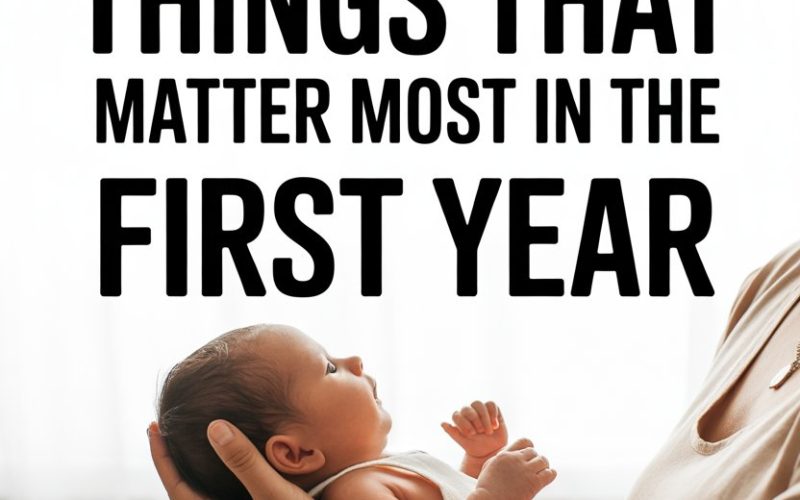Whoever said “the days are long, but the years are short” clearly had an infant attached to their hip and a cold cup of tea within reach.
Those first 12 months can feel like one endless loop of feeds, nappy changes, and Googling “Is green poo normal?” (Spoiler: Usually yes.)
If your memory is a blur of milky burps, suspicious rashes, and whether you’re meant to sterilise everything or just give it a rinse, you’re in the right place.
Here’s what’s actually worth focusing on in that magical, messy, slightly unhinged first year.
1. Sleep (Yours and Theirs)
Some babies arrive with the sleep habits of a hibernating bear. Others? Not so much. Baby sleep is famously unpredictable, and there’s no one-size-fits-all solution.
Creating a flexible bedtime routine can help, but don’t torture yourself chasing the elusive perfect nap schedule. If you need more science on infant sleep, this research from the Sleep Foundation is a good reality check.
Your sleep matters too, by the way. If you get the chance to nap when the baby naps, do it.
The laundry will wait. So will the dishes. You know what won’t? The next 2 am wake-up.
2. Feeding (However It Works)
Breast, bottle, pump, formula – fed is best. The pressure to do things “right” can be overwhelming, and the advice is often contradictory.
Listen to your instincts, ask for help if you need it, and remember: a full baby is a happy one. If your feeding plans change, that’s okay. La Leche League offers support whatever your journey looks like.
3. Nappy Changes
You’ll become a connoisseur of nappies in no time. Cloth or disposable, fragrance-free or with cartoon characters – it’s all about what works for your family.
Some days, you’ll feel like you’re single-handedly keeping the wipes industry afloat. Pro tip: keep a stash in every room (and your car, and your bag, and probably the neighbour’s house for good measure).
4. Skin to Skin Contact
There’s actual science behind those snuggles. Early skin-to-skin contact can help regulate your baby’s temperature, heart rate, and stress levels.
Plus, you get to sniff that top-of-the-head newborn goodness and pretend you’re not crying at a nappy advert again.
5. Growth Spurts (and Growth Charts)
“It’s just a phase” becomes your new mantra. Some weeks, your baby will eat double, sleep half as much, and demand that you carry them everywhere.
Growth spurts are real, and growth charts are meant to be guides, not gospel. If you’re worried, never hesitate to chat with your health visitor or paediatrician.
6. Safe Sleep
The ABCs: Alone, on their Back, in a Crib. That’s what paediatricians recommend for safe sleep. Resist the urge to fill the cot with stuffed animals, pillows, or anything else that looks cute but can be risky.
7. Baby’s Milestones
Rolling, sitting, babbling, waving – every baby hits them at their own speed. If your child prefers to master the art of toe-sucking over crawling, they’re still on track.
Keep an eye out for major red flags, but don’t get caught in the comparison trap.
Your cousin’s baby isn’t better because he walked at nine months. He’s just different.
8. Your Own Wellbeing
It’s not selfish to care about your mental health. Postnatal anxiety and depression are more common than people realise, and reaching out for help is a sign of strength.
Find a friend, partner, or professional to talk to. If you’re feeling lost, Mind has resources for new parents.
9. Keeping Baby Clean (Without Overdoing It)
Babies are famously sticky and suspiciously good at attracting fluff between their toes. Bathing a couple of times a week is enough for most little ones, unless they discover the joys of spaghetti bolognese hair masks.
10. Social Support
It really does take a village. Even if your village is a WhatsApp group full of half-asleep parents and an army of willing grandparents.
Saying yes to help (or asking for it) doesn’t mean you’re failing. It means you’re human.
11. Baby Gear: What Actually Matters
That wipe-warmer is probably less crucial than you think. A safe car seat, a place for baby to sleep, and a pram you can steer one-handed while holding a coffee are the actual essentials.
The rest is optional (but fun to add to your online basket at 2 am).
12. Doctor Appointments and Vaccinations
Those endless check-ups, weighing sessions, and jabs matter. Keep track with a calendar or an app, and bring your questions – no one expects you to remember everything.
13. Talking to Your Baby
Yes, even when your conversation consists of “Ooh, look at those knees!” Chatting, singing, and narrating your day helps their language skills develop.
There’s evidence from Stanford University that babies whose parents talk to them more have bigger vocabularies later.
14. Tummy Time
Once the umbilical cord is healed, a few minutes of tummy time daily helps develop those neck and shoulder muscles. Some babies love it.
Others act like you’ve dropped them on a cactus. Short, frequent sessions are fine.
15. Trusting Your Instincts
You’ll get advice on everything from how to burp your baby to how to shape their inner artist (crayons at six months? Sure, Nana…). You know your child best. Trust that.
16. Self-Compassion
Some days, you’ll nail the “parent of the year” feeling. Other days, you’ll eat biscuits for breakfast and count Peppa Pig as educational. All of it counts.
Try to treat yourself with the same kindness you offer your baby.
17. Bonding in Your Way
Bonding doesn’t always happen instantly. Some parents feel that rush of love right away; others take a few weeks or even months. Both are normal.
Cuddles, singing, dancing around the kitchen – any time together builds your relationship.
18. Screen Time (Yours, Not Theirs)
Phones are lifelines, but endless scrolling through social media highlight reels can zap your confidence.
Take breaks, mute the “perfect” parents, and seek out honest accounts. If TV keeps you sane during cluster feeds, you have my blessing.
19. Babyproofing (When Needed)
Your newborn won’t crawl for a while, but it creeps up faster than you’d think. Start with obvious dangers like sharp corners, cords, and cleaning products.
Once your baby’s on the move, you’ll see your house through new eyes – and possibly contemplate living in a padded room.
20. Introducing Solids
Around six months, your baby will eye up your toast with suspicious interest. Start slow, offer lots of variety, and don’t panic if most of it ends up on the floor (or you). NHS Weaning Guidelines keep things simple.
21. Your Relationship (With Your Partner, With Yourself)
If you have a partner, your dynamic will shift. Date nights might turn into “micro-dates” over reheated leftovers. Make room for laughter and forgiveness.
If you’re solo parenting, treat yourself with that same patience and love.
22. The Photos (And The Memories)
You’ll take a thousand blurry photos and still wish you had more. Don’t stress about creating picture-perfect moments. The messy, silly, ordinary days are the ones you’ll want to remember.
Print a few. Stick them on the fridge. Brag to anyone who’ll listen.
The Only Certainty: Change
No two babies – or years – are the same. You’ll blink and suddenly those tiny, milk-drunk snuggles will be replaced by a giggling, food-flinging toddler.
The good news? Whatever you’re feeling, you’re not alone.
This year might be wild, but it’s yours. And that makes all the difference.




